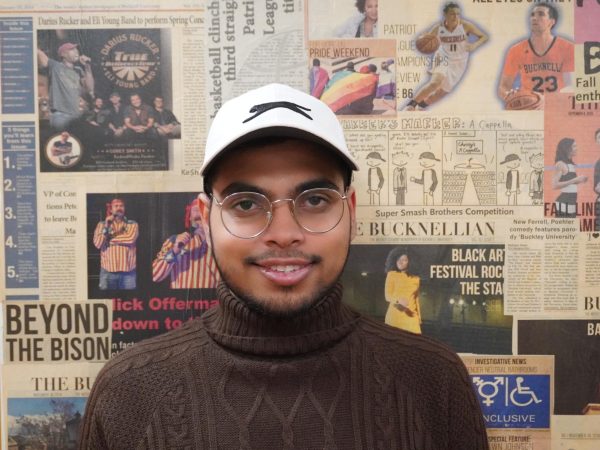Bucknell University has long prided itself on offering a rigorous, intimate education rooted in the liberal arts tradition. Nestled in the quiet rural hills of Lewisburg, our campus fosters close community, deep intellectual engagement and a unique sense of belonging. But that very intimacy and the geographic isolation that often accompanies it, can also create a kind of intellectual echo chamber. We speak often of the “Bucknell Bubble,” but too rarely do we confront what it costs us.
We need to. Because in a rapidly globalizing, deeply unequal and increasingly interconnected world, the stakes are too high for any institution to go it alone.
The Problem With the Bubble
The Bucknell Bubble doesn’t just insulate us from the noise of the outside world, it risks shielding us from the truths that complicate and challenge our worldview. We live and learn in a town with two bookstores, one movie theater and a relatively homogenous population. In such an environment, exposure to the cultural, socioeconomic and political diversity that defines our world becomes optional, rather than inherent to our learning experience.
This insularity shapes more than our conversations. It subtly influences what questions we ask, what issues we prioritize and even how we define success. It affects how we form networks and how we imagine our place in the world. When we find ourselves in environments that don’t mirror what we’ve known at Bucknell, the adjustment can feel harder than expected. Not because we’re unprepared, but because we’ve had few chances to engage deeply with communities and institutions that work differently. Without those experiences built into the rhythm of college life, even confident students can feel uncertain when they’re suddenly outside it.
To burst that bubble is not to dilute Bucknell’s excellence — it is to expand it. And that starts with partnerships that prioritize student collaboration and mutual exchange.
Collaboration Across Campuses
Every university carries the imprint of its location — its struggles, its triumphs, its people. But when students from different campuses learn with and from one another, those imprints become shared stories. Imagine Bucknell students working alongside peers from a tribal college in Montana on a joint environmental justice project, or co-developing a policy proposal with students from a historically Black university informed by their lived experience and community-centered activism.
This is not just about attending a conference together. It’s about building curricular and co-curricular bridges that allow students to co-learn and co-create. It’s about students collaborating on research, policy design, start-ups and art — not just within the safety of Bucknell’s walls but in real-world spaces shaped by very different resources, histories and realities.
Internationally, partnerships with universities in the Global South, for example, can open our eyes to alternative pedagogies and resourceful models of education that emerge not from abundance, but from resilience. Working alongside students in Pakistan, South Africa or Brazil allows for deep peer-to-peer learning rooted in shared problem-solving, mutual respect and humility.
This is where the real dismantling of the bubble happens: when students stop seeing difference as something abstract or academic and start experiencing it as collaboration, as a relationship, as growth.
A Stronger Network, A More Just Education
The future we’re preparing for — climate migration, AI ethics, decolonization of education — cannot be tackled from within a single institutional lens. These are complex, global issues that require the insights and imaginations of people from everywhere. So why not prepare students to meet that future together?
Imagine a semester-long virtual classroom linking Bucknell with institutions in Accra, New Delhi or Detroit, where students co-lead modules, co-author projects and co-present findings. Imagine student governments working together on mental health initiatives across campuses. Imagine collaborative journalism between student publications reporting from different geographies, offering one another fact-checks, context and solidarity.
These initiatives aren’t just hypotheticals — they are feasible, especially in a world increasingly structured by hybrid learning and digital connectivity. All it takes is the institutional will to prioritize relationship over reputation, dialogue over dominance.
And yes, faculty benefit too. Teaching across institutions allows for cross-pollination of pedagogy, access to diverse research contexts and the kind of interdisciplinary conversation that breathes new life into scholarship. But the real change begins — and stays — with students.
Rewriting the Narrative of Privilege
If we remain solely in our bubble, we risk reproducing the very systems of privilege and exclusion that higher education claims to dismantle. We cannot claim to prepare students for the “real world” while giving them a campus experience detached from the realities most communities face. We cannot advocate for diversity and equity if we don’t actively engage with institutions that were built to serve those historically excluded from elite education.
Expanding university partnerships is not just about gaining access to new knowledge. It’s about redistributing it. It’s about interrogating who has historically held academic authority and who has been left out of the conversation. And it’s about trusting students to help carry that conversation forward.
The Ask
Let Bucknell be bold enough to believe that its students are not only capable of engaging in these partnerships but deserving of them. Let us pursue coalitions not only with the Ivy League, but with community colleges, public universities, international hubs and historically underfunded schools. Let us build pipelines that go both ways. Let us normalize collaboration — not as a supplement to our education, but as its foundation.
Because if Bucknell truly seeks to empower students to “make a difference in the world,” it must first ensure they’ve met the world.
And that cannot happen alone.



















